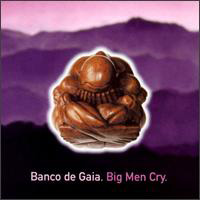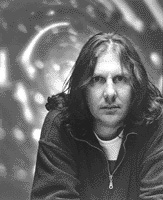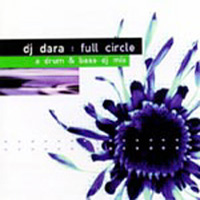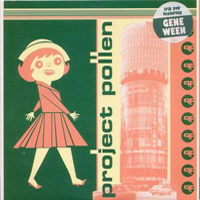 Banco de Gaia
Banco de Gaia
Big Men Cry (Mammoth)
by Malcolm E
Imagine, if you will, a man who writes techno with a concept for a song, not just an excuse to link quarter note beats together for hours on end. Now imagine a man who writes techno so bold as to use the sax player from Floyd’s Dark Side Of The Moon. Now imagine a rhinoceros balanced on a petri dish suspended over the Carlsbad Canyon bat cave by dental floss. Don’t question me. In any case, Banco de Gaia (aka Toby Marks) easily melds disparate elements in a weightless environment, creating some of the more interesting electronica available. Take, for example, his latest creation, Big Men Cry. A silence of ten seconds precedes the sound of an intergalactic time traveler arriving in a Precambrian age. The sound of dripping water is all that exists, but soon other noises can be heard, subtle inflections of shifting rhythms. Slipping into a dream-like state, the layers of sound build to an easy groove. Before you realize what’s happened, you’re on the dance floor, a wandering bass line picking up your feet. Bells chime, and you’re in the next song, “Celestine,” a psychedelic dub that includes saxophone by Dick Parry, the aforementioned Pink horn player. Throw that together with enchanting Middle Eastern vocal lines, and you’ve got yourself a song to smoke to. What are you smoking? Lion’s Ear? Is it legal?
 Ahem, moving on, Parry’s sax is immediately identifiable; “Hey, isn’t that the Wish You Were Here guy?” Deep, rich notes and scale tones that are part blues, part 20th-century classical. The dub groove picks itself up to propel the song even furthur (sic) along, sax gently shimmering over the top, until it’s time to come down, and into the next track, “Drunk as a Monk.” A heavy grinding beat accompanies an intensely layered vocal smatter. What’s that they’re saying? “Where’s my lager?” the melody over this is pseudo-new wave, almost Numan-ish, with a little Kraftwerk on the side, and then you get chanting monks. He piles the beats up so high, it’s like he’s supporting the ceiling of the sky. The first half of the disc seems to relate to the past. Samples of monks, cavernous raindrops and log-banging, aging hippies… but from the title track on, Marks only looks forward. “Big Men Cry” has almost no rhythm tracks, drifting in a sea of wires and LED displays, while a mournful violin serenades the stars. Ambient? No, not really. It’s more like melodic trance. There’s no chance of dancing, but there’s a very good possibility that you’ll sway back and forth a lot. Bringing us back to reality for a second is “Gates Does Windows,” the sound of whistling and birdsong lasting all of 35 seconds, but soon we are taken “One Billion Miles Out” alongside millions of electronic insects, twittering away while huge sounds loom in the background and a synth choir sings skewed praises to technology. 2001 strings take control as, beat-less, they rise to the waking sun – cut off at the last moment by a long, looming note, letting it float. This evolves into an asymmetrical rhythm pattern, not a beat at first, necessarily, but it gets there, escalating the trance, then fading blissfully away. The last track, “Starstation Earth” is once again faux-ambient, tiny notes glittering in space, with tweaked-out melodies zooming overhead. In the distance, we hear a lone astronaut singing a love song to his paramour, off on a distant planet. Then, creeping insistently up and pouncing, a beat enters the area and sweeps us along on a cosmic dance track, incorporating the previous elements into an electronic space gumbo, reminding us that the dance of the universe has a rhythm, and that rhythm is heard everywhere there is life.
Ahem, moving on, Parry’s sax is immediately identifiable; “Hey, isn’t that the Wish You Were Here guy?” Deep, rich notes and scale tones that are part blues, part 20th-century classical. The dub groove picks itself up to propel the song even furthur (sic) along, sax gently shimmering over the top, until it’s time to come down, and into the next track, “Drunk as a Monk.” A heavy grinding beat accompanies an intensely layered vocal smatter. What’s that they’re saying? “Where’s my lager?” the melody over this is pseudo-new wave, almost Numan-ish, with a little Kraftwerk on the side, and then you get chanting monks. He piles the beats up so high, it’s like he’s supporting the ceiling of the sky. The first half of the disc seems to relate to the past. Samples of monks, cavernous raindrops and log-banging, aging hippies… but from the title track on, Marks only looks forward. “Big Men Cry” has almost no rhythm tracks, drifting in a sea of wires and LED displays, while a mournful violin serenades the stars. Ambient? No, not really. It’s more like melodic trance. There’s no chance of dancing, but there’s a very good possibility that you’ll sway back and forth a lot. Bringing us back to reality for a second is “Gates Does Windows,” the sound of whistling and birdsong lasting all of 35 seconds, but soon we are taken “One Billion Miles Out” alongside millions of electronic insects, twittering away while huge sounds loom in the background and a synth choir sings skewed praises to technology. 2001 strings take control as, beat-less, they rise to the waking sun – cut off at the last moment by a long, looming note, letting it float. This evolves into an asymmetrical rhythm pattern, not a beat at first, necessarily, but it gets there, escalating the trance, then fading blissfully away. The last track, “Starstation Earth” is once again faux-ambient, tiny notes glittering in space, with tweaked-out melodies zooming overhead. In the distance, we hear a lone astronaut singing a love song to his paramour, off on a distant planet. Then, creeping insistently up and pouncing, a beat enters the area and sweeps us along on a cosmic dance track, incorporating the previous elements into an electronic space gumbo, reminding us that the dance of the universe has a rhythm, and that rhythm is heard everywhere there is life.



